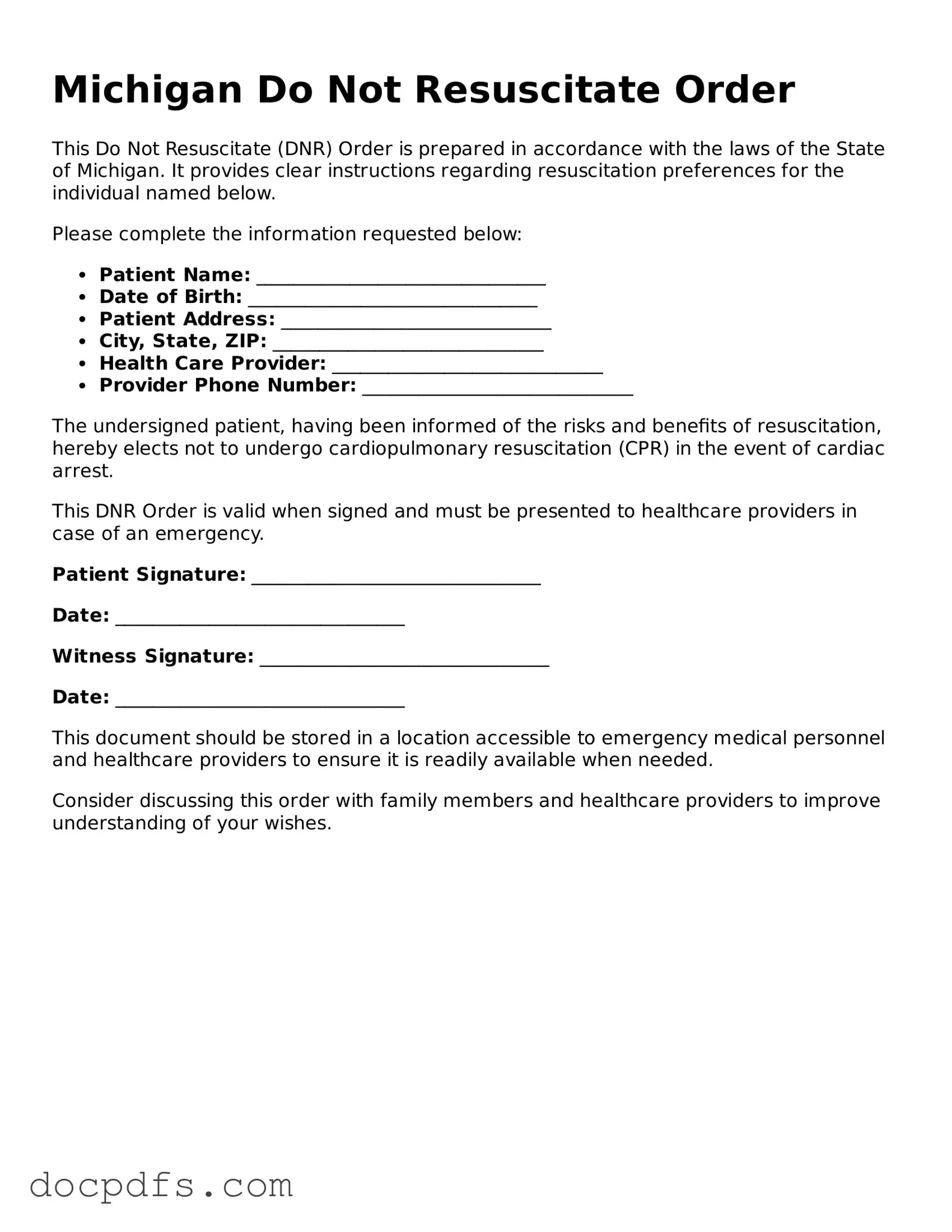What is a Michigan Do Not Resuscitate (DNR) Order?
A Michigan Do Not Resuscitate Order is a legal document that allows a person to refuse resuscitation efforts in the event of a medical emergency. This order specifically instructs healthcare providers not to perform cardiopulmonary resuscitation (CPR) or other life-saving measures if the individual’s heart stops beating or they stop breathing.
Who can request a DNR Order in Michigan?
In Michigan, any adult who is capable of making their own medical decisions can request a DNR Order. This includes individuals with terminal illnesses, severe medical conditions, or those who simply wish to avoid aggressive medical interventions at the end of life. Additionally, a parent or legal guardian can request a DNR Order for a minor.
How do I obtain a DNR Order in Michigan?
To obtain a DNR Order, you must fill out the official Michigan DNR form. This form can typically be acquired from healthcare providers, hospitals, or online through the Michigan Department of Health and Human Services website. Once completed, the form must be signed by the patient (or their legal representative) and a physician.
The DNR Order form requires several key pieces of information, including:
-
The patient’s full name and date of birth
-
The name of the physician completing the order
-
Signature of the patient or their legal representative
-
Signature of the physician
Additional information may also be included to provide context about the patient's medical condition.
Is a DNR Order valid in all healthcare settings?
Yes, a properly executed DNR Order is valid in all healthcare settings in Michigan, including hospitals, nursing homes, and at home. It is essential to ensure that copies of the DNR Order are readily available and accessible to healthcare providers in any setting where care may be provided.
Can a DNR Order be revoked?
Yes, a DNR Order can be revoked at any time. The patient or their legal representative can verbally communicate the revocation to healthcare providers, or they can destroy the written DNR Order. It is advisable to inform all relevant healthcare personnel about the change to ensure that your wishes are respected.
What happens if a DNR Order is not followed?
If a DNR Order is not followed, it can lead to unnecessary and unwanted medical interventions. In Michigan, healthcare providers are legally obligated to honor a valid DNR Order. If a DNR is ignored, the healthcare provider may face legal consequences, and the patient’s rights may be violated.
Can a DNR Order be combined with other advance directives?
Yes, a DNR Order can and often should be combined with other advance directives, such as a living will or a durable power of attorney for healthcare. These documents work together to provide a comprehensive plan for medical treatment preferences and decision-making in the event that a person is unable to communicate their wishes.
Do I need a lawyer to create a DNR Order?
No, you do not need a lawyer to create a DNR Order in Michigan. The process is straightforward and can be completed by following the instructions on the official DNR form. However, consulting with a legal professional can provide additional peace of mind, especially when coordinating with other advance directives.
Where should I keep my DNR Order?
It is crucial to keep your DNR Order in a safe but accessible location. Many individuals choose to keep it in their medical records, with their primary healthcare provider, or in a place where family members can easily find it. Some people carry a wallet card indicating that a DNR Order exists, which can help alert emergency personnel in case of an emergency.

